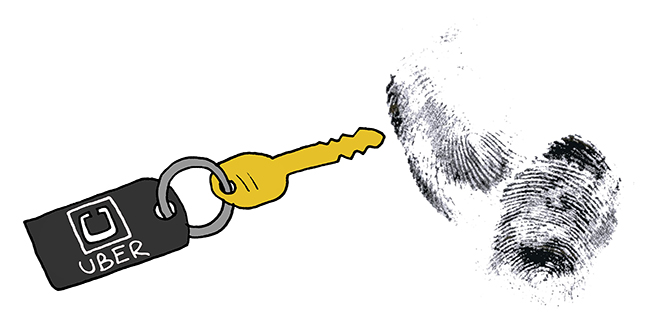The ongoing gridlock between the Austin City Council and Transportation Network Companies (TNC) has put companies such as Uber and Lyft in the spotlight in recent months. Last week, the council passed a resolution to develop requirements for fingerprint-based criminal background checks for company drivers. While TNCs have continuously resisted this requirement, it may be in their best interest to work with the city council to promote public safety.
TNCs currently operate on the basis of name-based background checks. This method of hiring concerns those who fear these checks result in inaccurate identification. Name checks run applicants on a limited amount of records and are based on personal identifiers that may not be unique to the person, such as their race, sex and name. Conversely, automated fingerprint identification systems have been shown to produce error rates less than one percent. Ride-hailing services should look to adopt this measure and put public safety at the forefront of their service instead of looking to maximize their number of drivers.
Uber representatives maintain that the process of fingerprint-based checks creates “friction” and hurts customer response time. The company relies heavily on the number of drivers available at one time.
However, Council Member Ann Kitchen, chairwoman of the Mobility Committee, said this reasoning doesn’t have merit within the resolution.
“We’re not talking about an erroneous process; we’re talking about a process where people have multiple options,” Kitchen said. “The fingerprint process itself doesn’t take long and the FBI process of checking the database doesn’t take long either.”
Austin, San Antonio and Houston have contended with how to implement fingerprint-based checks. Uber recently began to reoperate in San Antonio after leaving the city due to these ordinances. Lyft no longer services the Houston area. Given Austin is in the top three of Uber’s most profitable locations, the company has incentive to stick around. But with a growing number of complaints, these companies are not the experts when it comes to public safety. Cities must stand firm in their resolutions.
Part of the motivation in looking to hold these companies responsible to a more stringent background check comes from the alarming amount of assaults reported in relation to these ride-hailing services. Maintaining that one assault is too many, the city council is feeling the responsibility to protect its citizens.
“The bottom line is that it’s our responsibility to protect public safety,” Kitchen said. “We don’t have to choose between having transportation options and protecting people. It’s not an either-or question.”
Leaving yet another city due to background checks would be a slap in the face to loyal customers and would show little regard for customer safety. The best option for these services would be to cooperatively work with the city to employ background checks that put their user’s well-being at the top of their priorities.
Arevalo is a journalism freshman from McAllen. Follow Arevalo on Twitter @alexparevalo.





















